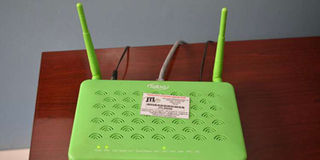No cows for dowry; unlimited Wi-Fi will do

A Wi-Fi router. PHOTO | SALATON NJAU | NATION MEDIA GROUP
What you need to know:
We live in a knowledge economy in which mere access or possession of a tool or asset is not in itself beneficial. What makes the difference is the skill to use the tool to turn the asset to a benefit.
Therefore, what counts is not the quantity of resources one has but the skills with which they are managed to generate value to the owner and the society at large.
Our society needs to use Wi-Fi and other forms of digital connectivity for knowledge creation, validation, sharing and perpetuation. Knowledge empowers, liberates and transforms people.
I recently came across a short video clip showing Ugandan comedian Anne Kansiime reprimanding her “daughter” for dating a white man. She lamented that white men do not know how to treat a mother-in-law.
She narrated an incident in her village where a white suitor embarrassed the woman’s family by bringing the mother-in-law a bouquet of flowers. But her worst fear was that her daughter’s white suitor may end up bringing her Wi-Fi as dowry. She explained desperately that this would make her the laughing stock of the village for years. This fear caught my attention.
As a father of girls, I wondered whether I would consider Wi-Fi as the bride price for any of my angels. Having given the matter serious thought, I am convinced I can accept unlimited broadband Wi-Fi as dowry for my girls. The problem is how to convince my clan that Wi-Fi is as good as several four legged animals in securing the hands of our warm blooded pretty daughters in blissful marriage.
In my hunt for reasons to convince my kinsmen that Wi-Fi is valuable, I remembered that there is an athlete in this country who has capably turned Wi-Fi into wealth. He yearned to advance his skills in throwing the javelin but he did not have a coach. He turned to Wi-Fi to access demos and “teach-yourself” tutorials from YouTube.
He has since won gold medals in several games, including the African Championships, All-Africa Games, Commonwealth Games and World Championships. He is a living example of how transformative Wi-Fi can be.
I have also remembered many cases of how Wi-Fi and digital devices have turned impoverished communities into self-sustaining economies. Earlier in this millennium, rural folks in India used an innovative portable device known as Simputer (simple computer) to connect to and access markets for their farm produce.
AID FARMERS
In Kenya, there are several mobile phone–based solutions that aid farmers to access markets, predict weather patterns, access veterinary services, manage diseases and pests, keep timely records for effective decision-making and share best practices and lessons with each other.
All these, and many others, are possible because Wi-Fi-enabled devices flatten the world. They help us to overcome limitations associated with distance and time in innovative ways. Thus they converge and shrink the continents into a global village controlled by a button click or finger-touch.
With unlimited broadband Wi-Fi, I will not need to leave the comfort of my house to work. I’ll conduct my research, consultancies and classes without having to step out of the house. Therefore, by giving me unlimited Wi-Fi, my daughters’ suitors will offer me a platform to create wealth in an equally unlimited manner. Isn’t that much better than several head of cattle and other tokens? Yes, it is. Effective use of Wi-Fi will give me the power to buy as many of these as I wish.
Have you imagined what you can do with unlimited broadband Wi-Fi? The problem with many of us is that we largely use the Internet to gratify needs that impoverish us. Yes, while just a few of us transact lucrative business on social media, the vast majority of us squander our meagre resources on egoistic digital ventures.
We live in a knowledge economy in which mere access or possession of a tool or asset is not in itself beneficial. What makes the difference is the skill to use the tool to turn the asset to a benefit. Therefore, what counts is not the quantity of resources one has but the skills with which they are managed to generate value to the owner and the society at large.
Our society needs to use Wi-Fi and other forms of digital connectivity for knowledge creation, validation, sharing and perpetuation. Knowledge empowers, liberates and transforms people.
Dr Tom Kwanya teaches information and knowledge management at the Technical University of Kenya; [email protected].




